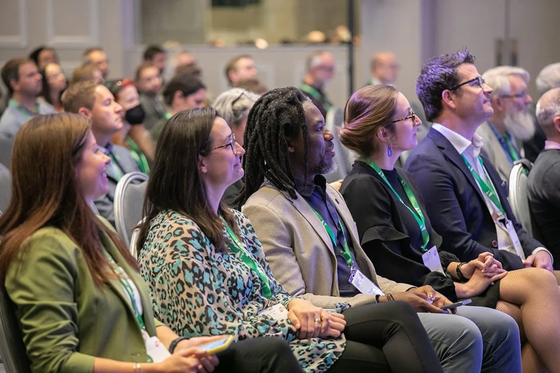The Association of Learned and Professional Society Publishers (ALPSP) Annual Conference was held in Manchester from 11-13 September and was visited by just under 300 delegates from across the academic publishing industry. For me it was the first time visiting this conference and I must say, it was a pleasure to participate. The main topics discussed were Open Access, AI and research integrity. Three topics that definitely have links to what we are doing with Global Campus!
Generative AI
The opening of the conference started with the keynote of Jake Okechukwu Effoduh, an assistant professor of Law at Toronto Metropolitan University, who, in his talk, spoke a lot about open access and Generative AI. And it was great to see that he was capable of making these topics personal to himself. Open Access brought him a lot and is bringing a lot to the Global South because knowledge is available for free, but at the same time the Open Access (OA) business model makes it difficult for scholars in the Global South to contribute through this route. Simply because the article processing charges (APC’s) are often too high. Another downside of OA published content is that it is easy to misuse by GenAI tools as training material. Changing the Creative Commons license on this published content is an option in the future, as was suggested in a different session. But this has the downside that the GenAI models may become worse, because the training content is of lower quality. It actually opens up the opportunity for publishers to create a new source of income by licensing it’s content to GenAI companies to train their models. It’s not the first time this has been suggested, but so far there aren’t any examples yet of publishers doing this. Who will be first?
Research Integrity
The next big hot topic in publishing: research integrity. The topic was discussed in many sessions during this ALPSP and, in the innovation award ceremony, there were also three nominated initiatives that focused on this topic. In the end it was Adam Day’s Papermill alarm that won. Unfortunately, there is an increasing need for these types of tools, since many publishers suffer from a bombardment of low-quality papers, increasing pressure on peer reviewers. But because of the APC model, there is an incentive for publishers to accept more. Having tools that help filter out the most obvious low-quality manuscripts and potential papermills will hopefully soon make a difference in the industry!
Peer review
The link of all these topics with Global Campus is obvious. We get a lot of questions regarding if there’s any integrity check for the reviewers we suggest. So far, this is done by only us removing retracted papers so they cannot be influencing the suggestions. But it’s likely that there will be more checks included in the future!
The rise of Open Access is making scholarly content more accessible, and therefore increasing the value for platforms like Global Campus, because navigating through these growing piles of academic work is increasingly difficult. And last but not least, we often get asked what we think of AI in publishing, since we are using AI in Global Campus to provide people with the best reviewer suggestions. Therefore, it is safe to say that we like the opportunities this technology brings to the table. However, we are also a strong advocate of keeping humans in charge. And the way we use AI in Global Campus is quite different from the way AI can be used to threaten the publishing industry. In that respect, I really liked the comment of Jake to let people disclose which AI tools they used. In the future this might not be necessary anymore, because AI will become normal. But today, we are still in the early phases of this technology and in order to understand AI, and the way people use it, disclosing it would be a good start. Just like people were asked to disclose whether they used ‘The Internet’ when writing pieces in the 2000’s.
In conclusion, it was a great first visit to the ALPSP conference! A lot of interesting talks and discussions with both familiar faces and new ones. I’m confident this will lead to more partnerships and users for Global Campus in the foreseeable future. Looking forward to meeting you all again in Frankfurt next month!

